
ZOMBIE-BOY AND THE SECRET ENGINEERS
by
Neil Cocker
As McPhee stood in the queue outside the Sexually Transmitted Infections clinic, trying not to scratch his crotch, he remembered the doughnut in his jacket pocket. Ya beauty, he thought. He took the doughnut out and unwrapped the cellophane. Some of the chocolate icing had stuck to the wrapper and he licked it off, ignoring the itch deep in his jeans. His first bite into the doughnut was well-executed (expertly done, he mused to himself) but as he chewed, working the cake pulp around his dry mouth, thinking about how this simple act proved that he wasn�t in the slightest bit nervous, a crumb caught at the back of his throat and he began to cough. It started as a tickle and built into a spasmodic hacking - karch karch ech karch ech - and the violence of this made him drop the other half of the doughnut. It bounced once and landed at his feet. As he choked and spluttered a fragment of the half-masticated dough sprang back up into his mouth. He spat it into his hankie. He knew everyone was watching him.
The security guard unlocked the door and the queue slowly filed into the clinic. Face glowing like lava, McPhee followed the others through to the waiting room, clearing his throat as he went. He watched as the people in front of him pressed the button on the ticket machine, waited for an agonising two seconds until a slip of paper protruded like a mocking tongue, and tore off their allocated number. The queue shuffled forward. McPhee bit his lip and tap-danced his toes against the vinyl floor. They were so fucking slow! Jesus, they were slow.
Eventually it was his turn, and he snatched off ticket B7. He hoped the slow bastards in front of him hadn�t taken all the decent seats, and looked around the room for the spot with the best legroom and view. He reminded himself that he wasn�t at the cinema and chose a seat in the corner by the window.
The waiting-room was painted white and had posters on the walls about condoms and gonorrhoea and the importance of respecting your partner. Opposite where he was sitting were two doors, both painted mint-green; the one on the left had a black number 1 stencilled on the front, and the one on the right a number 2. Above the doors was a digital display, blank and not quite ready to announce its first victim.
McPhee noticed he still had doughnut crumbs down the front of his fleece and brushed them off with his fingers. The nervousness wriggled in his guts like a tapeworm, and he shifted in the shiny plastic seat to get comfortable. He looked out the window onto the muddy canal. The clinic was on the fringes of the red light district. It was a part of Amsterdam he knew well; he worked not far from here in Spike�s Bar, a cannabis-friendly pub owned by a fat Cockney called Stu (and not Spike, something that confused McPhee as much as the customers). McPhee worked six nights a week cash-in-hand, and saw the red light district from the unfamiliar perspective of the bored and sober.
In his head he had a mental map of the district, simplified as if it were laid out in a straight line. At the north end, Centraal Station disgorging leery tourists every weekend like a projectile vomit aimed at the coffeeshops and prostitutes. The Warmoesstraat heading south-east, snaking down past neon-lit Irish pubs (FULL BREAKFAST LIVE MUSIC SKY SPORTS) and sex shops (PRIVATE CABINS CHOICE OF 8 MOVIES) and Chinese restaurants (7 EURO ALL YOU EAT 1 HOUR), leading to the alleyways of red striplights and girls rapping on their windows, beckoning as if they had a secret to tell you. And then, walking further, the crowds thinning, until you found yourself alone, standing on a bridge looking at the lights mirrored in the canal, feeling relief and sadness and longing.
The digital display bleeped on, and instructed ticket holder B1 to go to room number 1. McPhee watched as a woman with frizzy hair and a yellow scarf stood up, opened the door to room 1 and closed it behind her. The display bleeped again for ticket-holder B2 to go to room number 2. This time a young man crossed the room, eyes fixed on the floor.
What was behind the doors?
McPhee closed his eyes. He imagined darkness in room 1; stepping forward into its stink of oil and copper, the door bolting itself shut and a sudden click activating an electric light. The reddish illumination would reveal the room to be the inner chamber of what looked like a carwash, but instead of fluffy brushes and soap scooshers above you, dirty blades and blackened drills. There would be no time to think, just a squeaking groan as the blood-rusted machinery kickstarted itself, the blades pistoning up and down and the drills whirring madly, until all of it was just a flurry of steel, creeping downwards and you falling to the ground, fingers hooked into the floor�s metal grille. The first blade would thud into your back like an axe into a mango, and before you could even cry out the other angry teeth of the thresher would bite and chew at you wildly.
When the machinery had finished hacking, grinding, and pulping you, the contraption would jerk back upwards and then a hot water solution would dribble through tiny nipples in the walls, jets strengthening like a thousand pisses gathering momentum, until their thundering shower would rinse your mince through the grille and down under the building into a wide-throated pipe, and eventually what was left of you (mixed with hot water, lavender-perfumed detergent and neat bleach) would slosh from an outlet hole and torrent into the canal. Back in room 1, another soft click would indicate that the machinery had reset itself, its blades slotted together like folded arms.
And room 2?
McPhee thought for a moment, enjoying himself. The door to room 2 would open into blue sky, the air cold as peppermint, the land below a hazy mosaic of green. A cloud would blow across your vision, and when it had drifted by, a rope bridge would be stretched out in front of you. Step by step you would walk onto the bridge, peering through the chilly mist, the wobbly walkway creaking underfoot, until up ahead you would see the bridge end at a floating building. As you got closer you would see that the building was in fact a train station, with a mossy brick front and an ancient clock, its second hand thunk-thunking in the silence. The station would be empty, and the departures board would show only one destination, THE FUTURE LIFE OF ANGUS CAMPBELL McPHEE, platform 1, due in two minutes. And he would run up the piss-smelling stairs, a distant whistle sounding in the freezing silence.
The digital display bleeped and jarred McPhee back into consciousness. Number B5, room 1. He�d missed a couple of bleeps during his daydream. He glanced around the waiting room, worried for a moment that he�d been talking out loud, but nobody was paying any attention to him. Because the clinic was so close to the red light district he�d imagined himself sitting amidst skinny Eastern European girls with bruised faces and vacant stares, voluptuous divas examining their chipped red fingernails, silent young men with cropped hair and bomber jackets. But it was just like any other waiting room. The people looked normal. He felt stupid for thinking otherwise.
Then he noticed the man sitting opposite.
The man sat slumped back in his chair, head tilted towards the ceiling, a smile playing on his lips. He wore brown leather trousers, crocodile skin boots, and a hooded red sweater. He was totally bald, the surface of his head oiled and shiny. With his fingers he drummed a secret tune on his thighs. The display bleeped for number B6, and the man stood up lazily, like this was all such a chore, such a drag, and he shook the stiffness out of his legs before crossing the room. Looking at him as he walked, McPhee felt a jolt of recognition, but the feeling passed when he remembered again why he was here. His stomach fluttered.
A flurry of rain hit the window and he flinched, the noise startling him. What was it his mother used to say? The rain is God�s way of washing the planet, His way of teaching us that we must also cleanse ourselves of sin. In his head he saw the farmhouse, his parents standing at the door watching as the taxi drove away to the ferry, the grey skies overhead and treeless fields behind, rocks jutting through the grass like exposed bone. He hadn�t been back for seven years but his father�s parting words still rung in his head like a fire alarm. It had been the usual lecture on the evils of the mainland, performed in gaelic-inflected English and delivered with the standard biblical melodrama, but towards the end his rhetoric had got even more hysterical, moving up a notch from fire-and-brimstone to flamethrower-and-napalm. His father told him he was entering a valley of fornicators and pederasts, that he would walk with whores and murderers, that he would fall into a pit of sin and become one of the headless snakes wriggling in the filthy mud of the unbelievers.
�Jesus Dad,� he�d said. �I�m only moving to Glasgow.�
Glasgow taught him it was okay to enjoy himself. Fun was not punishable. It was okay to have hobbies other than keeping the family�s sheep off the road. It was okay to go for a few drinks, have sexual relations before marriage, eat more than one chocolate biscuit at a time. Grey, dreich, puke-stained Glasgow was a shimmering rainbow to him. And after one sip of freedom, he wanted to take gulps, wanted to drink his fill of cities until he was dizzy and intoxicated. So after Glasgow he went on to London, then Dublin, San Diego, Melbourne and Berlin, working the bars and building sites of the world, ticking his way through his address book of displaced islanders, until finally, like debris washed ashore after a plane crash, he�d ended up in Amsterdam.
But the island still haunted him.
Pictures in his head of working the fields with his father and brother, silently throwing the dried peats into the back of the trailer, fingers covered with thin grassy scratches like paper cuts. Walking past the harbour, the stacks of creels and heaped nets, the smell of fish and salt-spray, trawlers dotting the horizon, the bullying wind bashing into him and roughing him up. The cold greyness of the kirk, the stonework dotted with lichen and damp, the minister greeting them sternly at the door as they filed in. The barbed wire fences beaded with glittering diamonds of rainwater. His recollections of the island seemed to deepen and intensify as time passed, as if the memories were casked inside his head like whisky, distilling untouched in the darkness.
Bleep.
McPhee looked up. Number B7. He lurched to his feet and crossed the room. He opened the door to Room 2 and a woman in a white jacket motioned for him to sit down. There was no blue sky, no rope bridge. The woman spoke to him in Dutch, and he asked if it was okay to speak in English. She switched languages without pausing, and asked him his name and address, typing it into her PC as he spoke. She asked him what he wanted to be tested for. Gonorrhoea, syphilis, chlamydia? HIV? McPhee told her yes. Her mouse double-clicked. She asked him if he had any physical symptoms, and he told her no (in his opinion, the itch in his crotch was purely to do with nerves). She asked him if he slept with women or men, or both. Only women, he told her. �Only women?� she repeated, as if in doubt. He nodded. She scribbled something on an appointment card, handed it over, and told him to return to the waiting room. He would be called again for his test.
When he returned to the waiting room, the bald man was in McPhee�s seat.
He felt a flush of anger, and sat down opposite him, the only place where there was space. He had lost his view of the whole waiting room, and of the digital display. Now he had to crane his neck to see the numbers appear. This injustice made his blood prickle. He glowered at the bald man, who sensed the attention and glanced up.
�How was your doughnut?� said the bald man.
McPhee stared at him.
The bald man spoke again. He had an Australian or New Zealand accent. �It was a joke, mate! Just tryin� to put a smile on your face. You ain�t Dutch, right? I can tell.�
McPhee said nothing.
�Let me guess, you�re from Ireland.�
McPhee shook his head.
�France?�
McPhee sighed. �Scotland,� he said.
�Skooootlind,� echoed the bald man. �Hoo lung hiv ye been in Amsterdam, laddie?�
It amazed McPhee that every non-Scot seemed to think they could do a passable Scottish accent, and amazed him even more that they thought that every Scot they met would somehow be amused or impressed by these attempts. �Two years.�
�And what brings you to these whores? I mean shores.� The bald man pretended to wince at his own joke.
�Work,� replied McPhee.
Baldy frowned. �I know you from somewhere,� he said. �Where do you work?�
�In a pub.�
The bald man snapped his fingers. �Spike�s Bar! The all-night place!�
McPhee agreed with a twitch of his eyebrows.
�I knew it mate! I never forget a face!�
McPhee suddenly realised who the bald man was. He hadn�t recognised the face, because once it had been topped with bleached blond hair and garnished with a wispy goatee. But now he remembered. Lunk.
�You still work at Spike�s?� said Lunk.
�Aye,� said McPhee.
�I haven�t been there now for� oh, about six months. Did you hear the news?�
McPhee nodded.
The display bleeped for B6 to go to room 12 and Lunk stood up and rubbed his hands together. �The executioner calls,� he said, and laughed. �Russian roulette, ain�t it mate? Spin the barrel and the bullet might be yours.� McPhee watched him as he headed towards the stairs.
Lunk.
Lunk was one of the �Secret Engineers.�
The Secret Engineers, as Lunk had explained to him last summer over the bar at Spike�s, was a �loose collective of artists, writers, and thinkers who want to secretly re-engineer society in tune with their wild imaginings.� McPhee thought they were a loose collective of wankers and arseholes. The Secret Engineers met in Spike�s every Tuesday night and usually stayed at the corner table until dawn, swilling beer and wine and chain-smoking joints and drunkenly laughing at not very much and scribbling their wild imaginings into notebooks. Lunk was one of the chief organisers of the Secret Engineers but the true spiritual leader of the group was McPhee�s reason for the trip to the Sexually Transmitted Infections clinic.
Molasses MacQueen.
Bleep.
Number B7, room 14.
McPhee blinked the image of Molasses away and climbed the stairs to the first level, a red line on the floor leading the way. When he reached room 14 he knocked once and entered. A little guy with dreadlocks motioned him into the spare seat. McPhee watched as he absent-mindedly prepared the needle, reciting advice about free Hepatitis vaccinations as if he was a bored air steward delivering in-flight safety instructions. Still talking, now about the recent bad weather, Dreadlocks dabbed McPhee�s arm with a cotton swab, then quickly jabbed the needle in and siphoned out a syringeful of blood. The sharp clinical movement reminded McPhee of his father breaking a chicken�s neck, a cold and functional gesture that spoke of the necessity of difficult things.
Dreadlocks gave McPhee a jar for a urine sample and explained he should fill it in the toilet at the end of the corridor and then leave the jar downstairs at the drop-off point. Then he would need to come back in one week for the results. McPhee held the empty plastic jar in his hand, and imagined it full of his pee. He went back out into the corridor and walked towards the toilet.
*
One week later, at the end of his shift at Spike�s, just as dawn crept into the heavy skies, McPhee cycled out of the red light district, away from the gaudy neon towards the silence of the Jordaan. There was a bridge on the Prinsengracht where he liked to park his bike and watch the city wake from its slumber. The morning was raw; a thin shroud of mist hung above the surface of the canal, and a few ducks barged around the oily water. McPhee sat on one of the benches, his breath pluming in front of him as he opened his wallet and removed a folded piece of paper.
It was one of Molasses� numerous suicide notes.
Dear Zombie-boy,
I�m sorry.
Love M
She called him Zombie-boy because, as she had explained one night during the umpteenth meeting of the Secret Engineers, they all thought that he looked like a zombie as he stood under the green glow of the Heineken sign above the bar. She also explained (while pulling a strand of chewing gum from between her black-lipsticked lips) that she was a Canadian artist, and fifth-generation Scottish, and that her great-great-great grandparents had fled the bastard English who�d burned down their castle.
McPhee had heard it all before. �What do you want?�
�You.�
�What?�
�You have sexual magnetism.�
�But I don�t have any wild imaginings.�
�Exactly.�
And so they�d started having quickies in the cellar, urgent and without condoms, Molasses bent over a metal barrel, or bouncing on him as he lay on the cold floor with cement crumbs digging into his arse cheeks. Every time he tried to say something she�d put a hand over his mouth. �I love your Calvinist silence,� she would whisper.
The clinic opened at eight. McPhee bought an over-priced British newspaper and went for coffee. He stared at the headlines until his vision slipped between the black letters and the white page. He folded the newspaper away and stared out of the window. The city was awake, but grumpy: trams clanged down the street and commuters rushed by the caf�, umbrellas held up to the heavy rain like riot shields under a hail of bricks. McPhee bought another coffee and a doughnut. He liked doughnuts. He took a small bite and chewed it thoroughly. His parents had always warned him about the evil indulgence of doughnuts, along with all the other things he liked: comic books, walking alone on the beach, throwing peanuts into the air and catching them in his mouth, jumping into frozen puddles, Top of the Pops, laughing, skimming stones on the sea, sex. Especially sex. On the caf� wall, the clock hands crept closer to eight.
The rain had stopped by the time he left for the clinic. At the reception he received a different coloured ticket and was told to go to room 14, post his card through the letterbox on the door, and await his number being called for his results. �Just follow the red line upstairs,� explained the receptionist. And so he was back walking the red line, like following an artery leading to the beating heart of the building.
Room 14 was at the end of the corridor. There was a digital display overhead, currently showing number 503. His ticket was number 504. He dropped his card through the letterbox, and heard voices behind the door. His breathing was ragged, like he�d just been punched in the guts. He took a seat at the end of an empty row of chairs. He waited. Ten minutes passed. He picked at the lining on his jacket.
He�d heard about Molasses� suicide at Spike�s.
The Secret Engineers had split up after very loudly arguing about what was more old-fashioned, modernism or post-modernism, and had never been back to the pub. After the argument Molasses had helped McPhee clear up the broken glass and had then planted her black lips on his mouth before flinging her jacket on and rushing out into the rain. It was the first time she�d kissed him, and the last time he ever saw her.
Then, ten days ago, McPhee was pouring Guinness when he heard Stu talking with one of the regulars about the suicide of Molasses MacQueen. The previous day she had cycled into the path of a tram and had fallen under the wheels.
�Poor gal was a headcase, drugs depression an� everyfing,� Stu said. �She�d just found out she was HIV positive. Fucked anyfing that moved apparently. They all did, her crowd. I heard she mailed out suicide notes to all her lovers, or the ones whose addresses she knew. Almost like invitations to a party. A very scary party.�
And in a testament to the often derided Dutch postal service, the envelope arrived at the pub for McPhee the next day.
The door to room 14 opened and Lunk stepped out. He noticed McPhee and looked away, his head drooping as he walked towards the exit. McPhee closed his eyes and tried to imagine what was behind the door. No pictures came. He clenched his fists in his pockets. Slowly, an image formed in his head; he was back on the island, standing at the ferry terminal, its greasy tarmac littered with fishbones and crushed seashells. The PA system crackled on, a lazyding-dong-ding echoing across the shorefront, and he held his breath, waiting for the announcement, trying to blank out the swish of the tide and the clamour of the gulls.
And then, clear and simple, a message from the heavens.
Bleep.
� Neil Cocker
Reproduced with permission
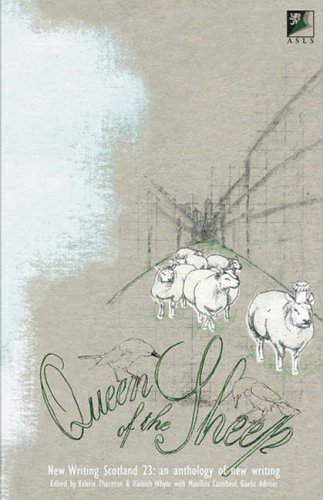
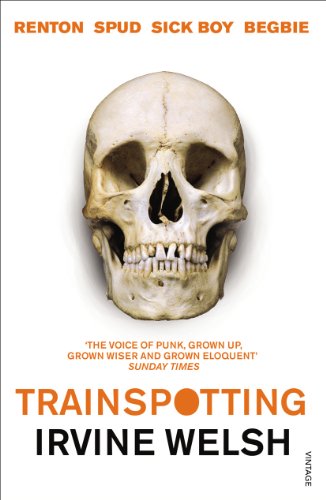 1. TRAINSPOTTING (the book)
1. TRAINSPOTTING (the book)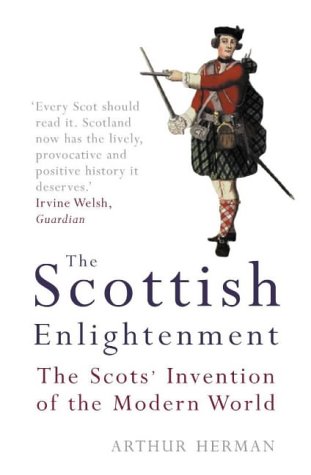
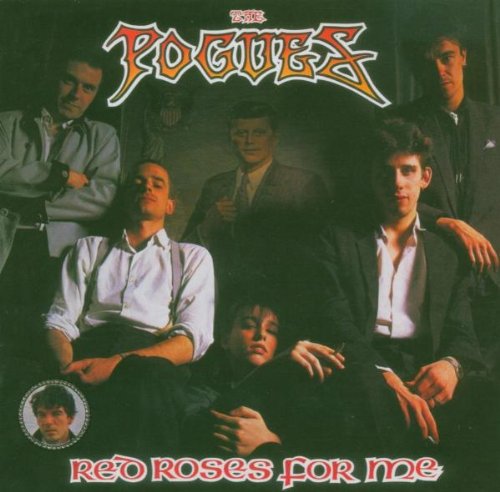
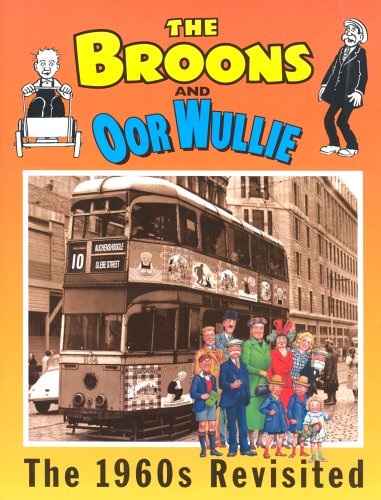
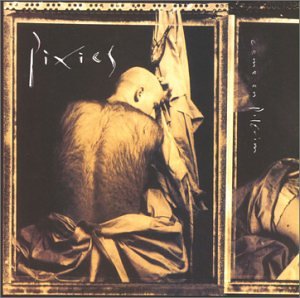
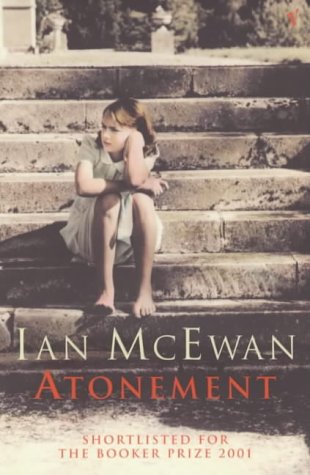
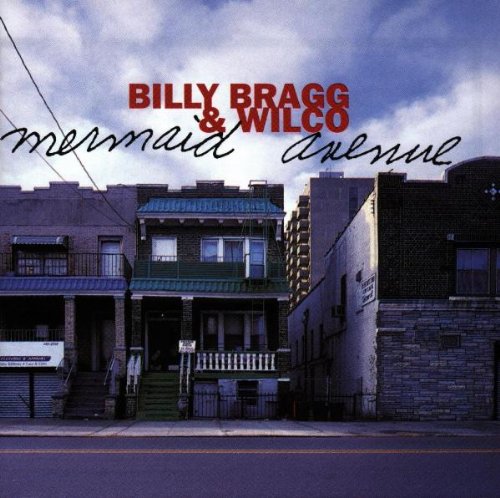 7. MERMAID AVENUE VOL. 1 - Billy Bragg & Wilco
7. MERMAID AVENUE VOL. 1 - Billy Bragg & Wilco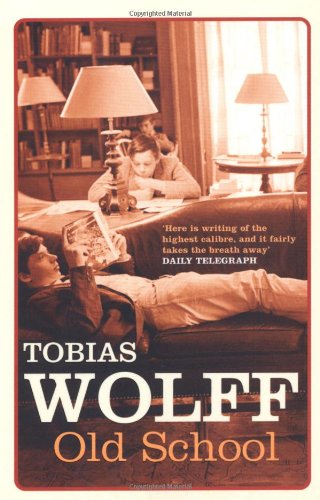
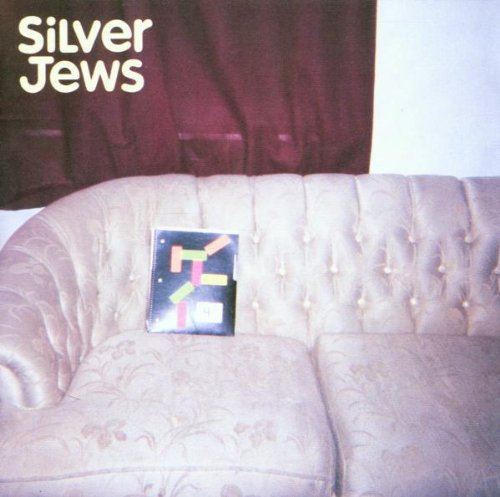 10. SILVER JEWS
10. SILVER JEWS
